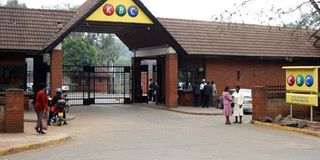Lawmakers probe KBC over ‘dirty’ deals with Multichoice and GoTV

The entrance to the Kenya Broadcasting Corporation (KBC) in Nairobi. FILE PHOTO | NATION MEDIA GROUP
What you need to know:
- The State broadcaster entered into a joint venture with Multichoice in 1995 on a 40-60 per cent shareholding basis to provide a pay TV service (DSTV) that has seen the corporation recoup Sh1.8 billion in dividends since 1999 to date.
However, the dividends have been shrinking because of “business slump” brought about by “a decrease in the gross subscribers due to competition in the market.”
In the financial years 2017/18 and 2018/19, the government got zero dividends, according to a document submitted in the National Assembly.
The National Assembly has launched investigations into suspected fraud in the multi-billion-shilling business partnerships between Kenya Broadcasting Corporation (KBC), MultiChoice Africa Limited and GoTV Kenya Limited.
SHAREHOLDING
The probe by the committee on Communication, Information and Innovation was triggered by Gatundu South MP Moses Kuria, who claims the government is not getting value for the millions of public funds invested in the national broadcaster, according to questions filed in the House.
On Saturday, committee chairman William Kisang (Marakwet West) confirmed that investigations have been launched, noting the importance of establishing the relationship between the national broadcaster and the two private companies.
“The inquiry will establish the real contract between KBC and the two companies and whether the government is getting value for the money invested in the broadcaster,” Mr Kisang told Sunday Nation. The committee will summon ICT ministry officials led by Cabinet Secretary Joe Mucheru and the directors of the two companies.
MPs claim that the management at KBC may have been conniving with the two companies to swindle the government.
The State broadcaster entered into a joint venture with MultiChoice in 1995 on a 40-60 per cent shareholding basis to provide a pay TV service (DSTV) that has seen the corporation recoup Sh1.8 billion in dividends since 1999 to date.
However, the dividends have been shrinking because of “business slump” brought about by “a decrease in the gross subscribers due to competition in the market.”
In the financial years 2017/18 and 2018/19, the government got zero dividends, according to a document submitted in the National Assembly.
DIVIDENDS
The document shows that in 2014/15, KBC got Sh480 million, the highest ever recorded, compared to Sh4.9 million being the least for the 2003/04 financial year.
“There is no reason why we should support KBC when it’s not making money from the deals,” Mr Kisang said. On March 13, 2019, Mr Kuria sought to find out from Mr Mucheru the percentage of shareholding of KBC in MultiChoice Kenya Limited and when the shareholding was acquired.
He also wanted to know the total number of subscribers, the number in each category, total monthly gross revenue from each subscriber and dividends received.
Perhaps in a deliberate bid to save the face, KBC managing director Dr Naim Bilal wrote to Auditor General Edward Ouko requesting for a special audit on the State broadcaster’s partnerships. The May 29, 2019 letter lists the joint venture partnership with MultiChoice Africa limited and a proposed contractual partnership with GoTV Kenya limited.
“The purpose of the requested special audit is to obtain an independent assessment on the two ventures, to inform the way forward. Importantly, the two ventures have been a subject of concern from the Executive and Legislature,” Dr Bilal says in the letter.
FREQUENCIES
The request has raised issues with MPs now keen to know what the KBC management and ICT ministry officials have been up to.
“The ministry should tell us what it knows about these dealings,” nominated MP Godfrey Osotsi, a member of the committee, said.
The document before Mr Kisang’s committee shows that KBC and GoTV Kenya expressed a shared interest to enter into a joint venture in terms of which, KBC was to provide infrastructure in 15 sites and its frequencies in exchange for 10 percent shareholding in GoTV.
Though no agreement was concluded—meaning that KBC does not hold any shares in GoTV—GoTV Kenya has continued to enjoy the frequencies, infrastructure and equipment without paying.
Interestingly, the ministry has also declined to divulge the total number of subscribers in MultiChoice, the numbers in each category as well as total monthly gross revenue with Mr Mucheru saying “the exposure will have negative competitive position.”




